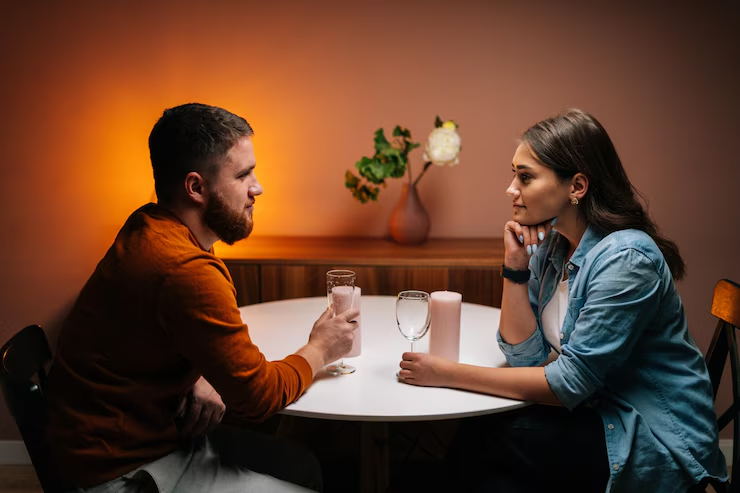Business
Why Self-Help Isn’t Helping Your Relationships
Published
9 months agoon
By
Bella
You’ve read the books.
You’ve journaled your heart out.
You’ve repeated affirmations like “I am enough” until you’re blue in the face.
So why does your love life still feel like a mess?
Why do you still feel anxious when someone pulls away… or ashamed for having needs at all?
Why do you still overthink texts, over-function in relationships, and secretly wonder if something’s wrong with you?
Here’s the truth most people won’t say out loud:
Self-help is often too shallow to heal relationship patterns that are rooted in your nervous system, emotional history, or attachment style.
It’s not that self-help is bad. It can be incredibly empowering to learn more about yourself, set intentions, or start a daily journaling practice. But if your relationships constantly leave you feeling insecure, unseen, or unlovable, it’s probably not a lack of information that’s holding you back—it’s the lack of deeper emotional integration.
Common Self-Help Myths That Keep You Stuck
Let’s bust a few myths you’ve probably heard:
- “You have to love yourself before anyone else can love you.”
- “Just raise your vibe and the right person will come.”
- “If you’re anxious, you’re just not confident enough.”
Sound familiar? These phrases get repeated like gospel in the self-help world, but they often ignore the real-life complexities of trauma, attachment wounds, and emotional neglect.
The truth is: if no one ever taught you how to feel safe, loved, or emotionally attuned to… then of course you struggle to love yourself. You’re not broken. You’re responding exactly as anyone would based on what you’ve been through.
Signs Your Self-Help Strategy Isn’t Working
Here are a few signs you might be stuck in the self-help hamster wheel:
- You intellectually understand your patterns but can’t stop repeating them
- You feel ashamed when self-help “doesn’t work” fast enough
- You bounce from book to book or coach to coach, but nothing really lands
- You feel more anxious after journaling or affirmations that don’t feel true
- You’re constantly trying to “fix” yourself instead of understanding yourself
If any of these hit home, it doesn’t mean you’re failing—it means your pain deserves a more compassionate, deeper approach.
What Actually Helps
When it comes to healing relationships (especially the one you have with yourself), here’s what actually moves the needle:
- Understanding your attachment style—so you can stop blaming yourself for feeling “too much” or “not enough”
- Nervous system regulation—so your body stops reacting like love is a threat
- Parts work—so you can meet the anxious, avoidant, or ashamed parts of you with compassion, not judgment
- Rewiring your emotional responses—so you can create new patterns, not just understand the old ones
This is the kind of work most mainstream self-help skips over completely.
So… Should You Hire a Coach?
If you’ve been thinking about hiring a relationship coach, here’s my honest advice: be selective.
There are amazing coaches out there—but also plenty who push surface-level strategies that leave you feeling more confused than before. You don’t need another coach telling you to “just communicate better” if your nervous system is screaming that you’re unsafe.
Before you invest, I highly recommend doing your research on what to look for in a relationship coach first.
You deserve support that’s trauma-informed, emotionally safe, and actually helps you connect the dots between your past and your present.
And if no one has ever taught you how to feel worthy, loved, or emotionally safe—you’re not behind. You’re just missing the kind of guidance that goes deeper than mindset hacks and morning routines.
Self-help can be a starting point. But real healing happens when you stop trying to “fix” yourself—and start learning to understand yourself.

The Role of Families in Preventing Online Gambling from an Early Age

Best Business Card Makers Of 2026: Top Picks for Job Seekers Who Want Polished Business Cards Fast (No Design Background Required)

The Architecture of Fortune: Deciphering Jackpot Patterns Through Temporal Synchronicity and Strategic Mastery

Maximizing Small Office Spaces: Smart Furniture Solutions for Startups

How Connectivity and Mobility Influence Condominium Demand in Singapore

Responsible Slot Gaming: Play Smart and Safe

Why Milk Bone Dog Treats Are Every Dog Owner’s Favorite?

Why Routine Window Washing Enhances the Health and the Beauty of Your Home

How Malaysia’s “Commuter Mobile Culture” Shapes the Way We Use Apps in 2025

